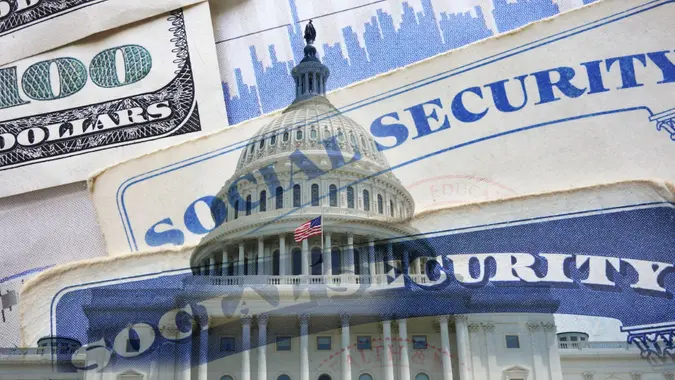3 Reasons Why You Should Decide Your Retirement Age in Your 30s

Commitment to Our Readers
GOBankingRates' editorial team is committed to bringing you unbiased reviews and information. We use data-driven methodologies to evaluate financial products and services - our reviews and ratings are not influenced by advertisers. You can read more about our editorial guidelines and our products and services review methodology.

20 Years
Helping You Live Richer

Reviewed
by Experts

Trusted by
Millions of Readers
While every point in life entails changes, being in your 30s often means going through a lot of them, simultaneously.
These might include starting a career, starting a family, moving, or buying a home — and these years are often associated with many milestones, which in turn can have an impact on that cohort’s financial well-being.
With that said, is being in your 30s the right time to decide your retirement age? And if so, what are the reasons to do so when so much is already happening?
“It’s never too early to start planning for major goals, and retirement is certainly one of life’s major goals,” said Kyle Enright, president of Achieve Lending. “Planning for retirement early generally means saving accordingly, and we know that Americans need to save a great deal more than they are right now for retirement.”
Here are some of the other reasons it can be a smart financial move to decide in your 30s when to retire, according to experts.
(And here’s what you should be doing in your 30s to build wealth.)
It Allows for Long-Term Planning and Taking Advantage of Compound Interest
Deciding your retirement age in your 30s is a significant financial decision that needs to be taken under careful consideration, said Cliff Ambrose, FRC, founder and wealth manager at Apex Wealth.
Indeed, as Ambrose noted, it allows for long-term planning and the opportunity to take advantage of compounding interest by starting to save and invest early.
“Additionally, setting a clear retirement goal in your 30s can provide motivation and direction for your financial decisions,” he added.
The Motivation To Not Get More Debt
As Achieve’s Enright noted, planning for retirement early also generally means saving accordingly.
“And we know that Americans need to save a great deal more than they are right now for retirement,” he said. “So, setting a retirement goal early on — with the accompanying commitment to plan for that goal — is smart.”
Enright further argued that another advantage of targeting a retirement age early on is the motivation it should provide to avoid credit card debt and other debt.
“After all, if you’re focused on saving and getting into a good financial position, you won’t want debt to be a part of that,” he added.
It Gives You Options
The number one reason you should decide your retirement age in your 30s — and select an early retirement age — is optionality, according to Robert R. Johnson, Ph.D., CFA, CAIA, professor of finance, Heider College of Business, Creighton University.
“If you set an early retirement age in your 30s and plan to and accrue enough wealth to retire early, you afford yourself the opportunity (but not the obligation) to exercise that early retirement option,” he said, adding that having optionality concerning your retirement age, and in life in general, is a huge advantage.
Pitfalls To Avoid
Yet, some experts also said that if you’re considering deciding your retirement age in your 30s, there are potential pitfalls to consider.
For instance, predicting future circumstances, such as changes in health, career trajectory, or unexpected financial setbacks, can be challenging. And as the saying goes, “life happens.”
Indeed, life is dynamic, and what seems feasible in your 30s may not align with your circumstances in the future, said Apex Wealth’s Ambrose.
“Committing to a specific retirement age too early may limit flexibility and prevent adaptation to changing goals and priorities,” he said, adding that while setting a retirement age in your 30s can be a proactive financial move, it’s essential to regularly reassess your plans as life unfolds.
Other experts also argued that it’s important for young adults to reframe “retirement.”
For instance, rather than not working at all, maybe it’s getting to a financial position in life where you have the option to do what you want, said Enright.
“Maybe you’ll want to take a break from working (think “gap year” or “sabbatical”), or try your hand at something new. It can be much easier for young adults to save for options than save for retirement,” he added.
Finally, some experts said that the decision should be based on age, but rather on whether you are financially independent or not.
“I do not think we should associate someone’s age with when they retire. These days, retirement typically just means the time in which someone stops working full-time in a career that, perhaps they have been doing for several years or decades,” said Chris Urban, CFP, RICP, founder at Discovery Wealth Planning.
More From GOBankingRates
 Written by
Written by  Edited by
Edited by 


























